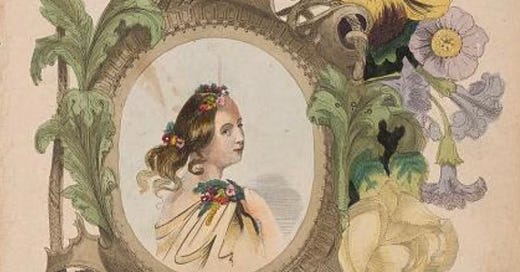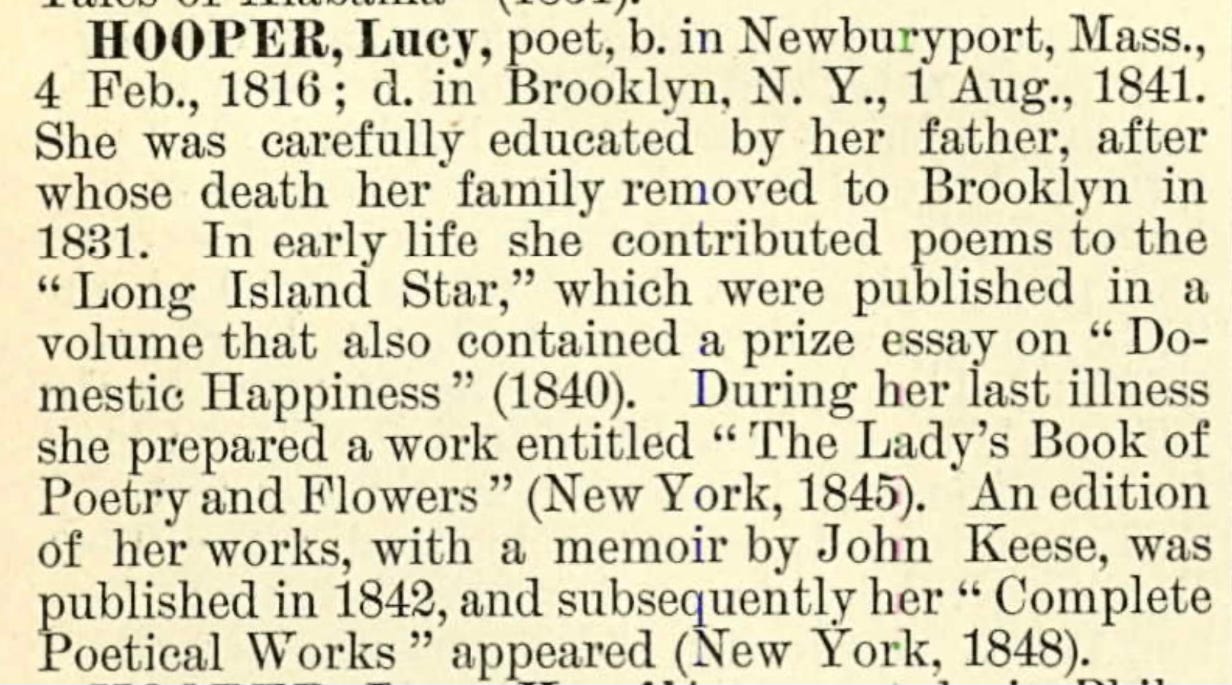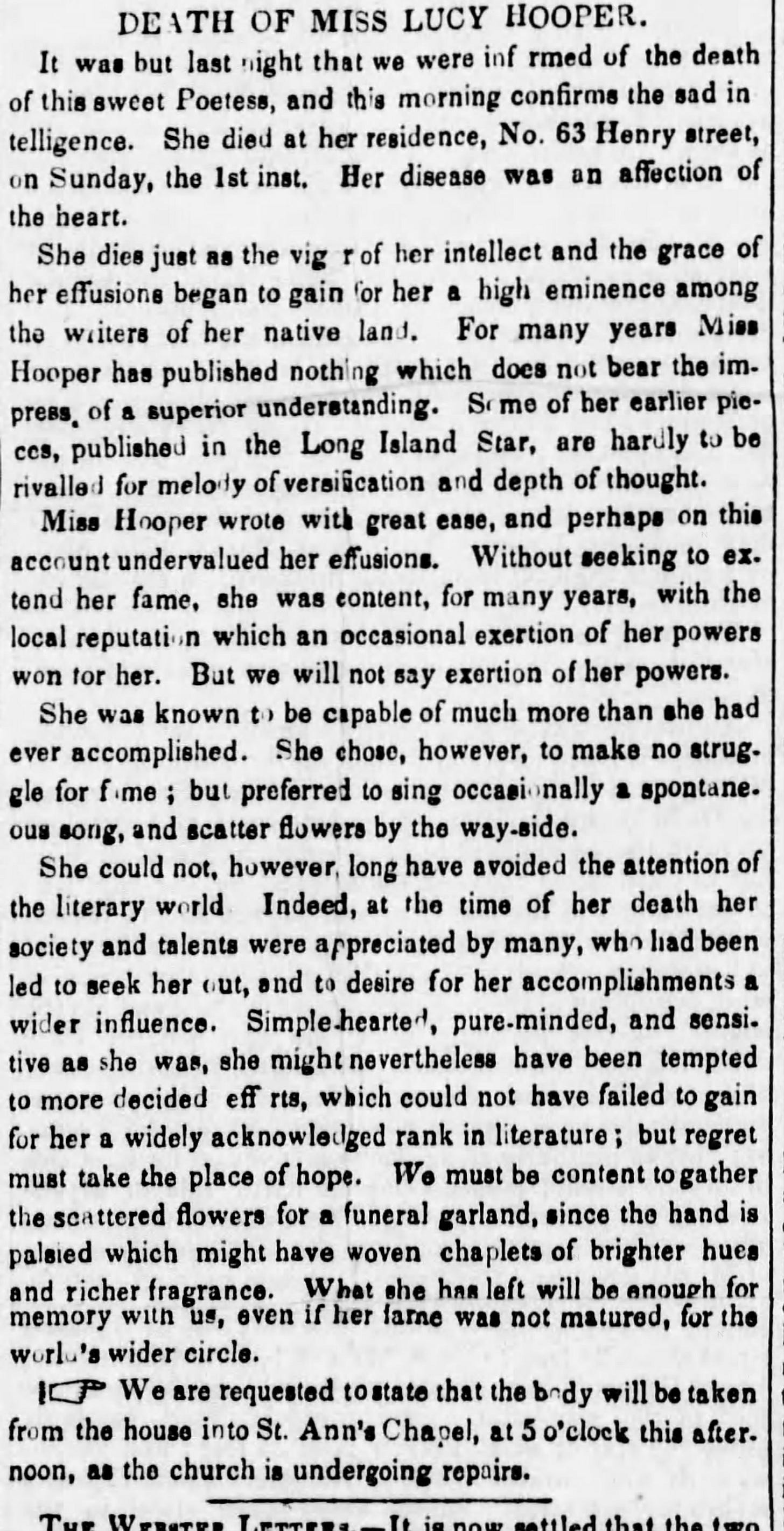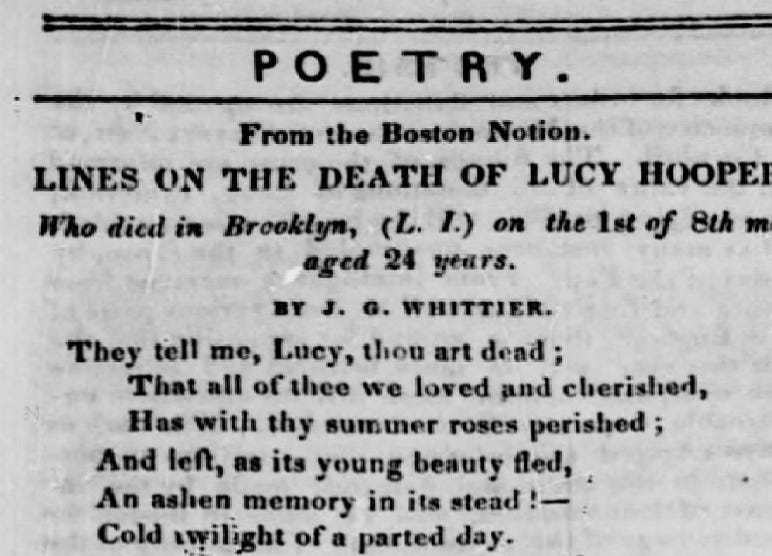I need to keep better notes because I don’t know how I found out about Lucy Hooper, but I added a note about her to my Trello board on April 28th. After some fruitless searches through email to find out who sent me the info, I’ve decided, once again, to get better at taking notes. (If someone is reading this and thinks they told me about her, let me know!)
However I found out about Lucy Hooper, I’m pleased to have done so, and not just because of the beautiful color plate in her book, The Lady’s Book of Flowers and Poetry.
More on that in a bit but first, let’s meet Lucy properly.
Her Biography
I learned quite a bit about Lucy from Appletons' Cyclopædia of American Biography1
“Hooper, Lucy, poet, b. in Newburtyport, Mass., 4 Feb., 1816; d. in Brooklyn, N. Y., 1 Aug., 1841. She was carefully educsated by her father, after whose death her family removed to Brooklyn in 1831. In early lfie she contributed poems to the “Long Island Star,” which were published in a volume that also contained a prize essay on “Domestic Happiness” (1840). During her last illness she prepared a work entitled “The Lady’s Book of Poetry and Flowers” (New York, 1845). An edition of her works, with a memoir by John Keese, was published in 1842, and subsequently her “Complete Poetical Works” appeared (New York, 1848).
From other information on Ancestry, I believe she was the eighth of ten childen born to Joseph Hooper and Mary Harris Hooper.
Her obituary appeared in the Brooklyn Evening Star, August 3, 1841.
In the obituary, they said she died of “an affection of the heart.” Other sources, including Wikipedia, noted she died of consumption (tuberculosis).
“Since childhood, her health had been delicate, and she was affected deeply by the death of her father, and other domestic problems. Hooper died of consumption at Brooklyn, on August 1, 1841.” - Wikipedia.
They also noted she had an interest in both botany and poetry. Perhaps it was those two interests that led her to edit The Lady’s Book of Flowers and Poetry, published a few years after her death.
Poems and Memories of Lucy
After her death, John Whittier Greenleaf penned a poem about her that appeared in the October 15, 1841 issue of The Liberator. It is quite a long poem! Here’s the first verse.
In that same publication, there’s a poem written by Lucy about not being able to attend an abolitionists meeting in 1838.
In 1848, seven years after her death, The Complete Poetical Works of the Late Miss Lucy Hooper by Lucy Hooper was published. The first 40 pages of the 400 page book are long and verbose memories about Lucy.
Though she was only 25 years old when she died, she apparently made quite an impression on her friends and other writers!
“We must be content to gather the scattered flowers for a funeral garland, since the hand is palsied which might have woven chaplets of brighter hues and richer fragrance.” - from the obituary of Miss Lucy Hooper
Why Is She a Lost Lady of Garden Writing?
I am claiming Lucy as a Lost Lady of Garden Writing because of the book she edited, The Lady’s Book of Flowers and Poetry (1845), which has the subtitle of “to which are added, a botanical introduction, a complete floral dictionary, and a chapter on plants in rooms.”
The first chapter contains information about how to care for plants indoors, with three main points. Give them good light, water them correctly, keep the leaves dusted. Following that, there are some poems, followed by chapters on various flowers with prose mixed with poetry. The poems are written by many different authors.
The book ends with two floral dictionaries. The first is a list of feelings or thoughts and which flower you would send to convey that feeling or thought. The second is a list of flowers and what feelings or thoughts are attached to them. (Don’t send me basil!) The book concludes with a Botanical Introduction: A General Account of Botanical Terms.
You can read the The Lady’s Book of Flowers and Poetry online.
You can also read her other books online: Scenes from Real Life: An American Tale (1840) and The Complete Poetical Works of the Late Miss Lucy Hooper (1848).
Questions
Her floral dictionary must have been one of the first ever published. (That alone makes her a worthy Lost Lady of Garden Writing!) I wonder how her floral definitions compare to those of later floral dictionaries? Fennel to you if you know!
And finally, what might Lucy have accomplished if she had lived more than 25 short years?
One last quote from her obituary, author unknown.
“She was known to be capable of much more than she had ever accomplished. She chose, however, to make no struggle for fame; but preferred to sing occasionally a spontaneous song, and scatter flowers by the way-side.”
Do you know of other women authors of gardening-related books that I should research as Lost Ladies of Garden Writing? Send them my way via a comment or email!
And if you find these articles interesting and think others will, too, please share them and subscribe.
I’ll return with the next Lost Lady of Garden Writing article in two weeks, on June 11. In the meantime, you can find me in several other places online: my website and blog, The Gardenangelists podcast, and my weekly newsletter, In the Garden With Carol.
From Wikipedia: “Appletons' Cyclopædia of American Biography is a six-volume collection of biographies of notable people involved in the history of the New World. Published between 1887 and 1889, its unsigned articles were widely accepted as authoritative for several decades. Later the encyclopedia became notorious for including dozens of biographies of people who had never existed. In nearly all articles about the Cyclopædia various authors have erroneously spelled the title as 'Appleton's Cyclopædia of American Biography', placing the apostrophe in the wrong place.”









Are you familiar with Molly Peacock's book The Paper Garden? Oh, my goodness, it details the (mostly later) life of artist Mary Delaney who, at age 72, created a new art form: mixed media collage. She created 985 botanically correct cut-paper flowers, which are now housed in the British Museum. Please check out her work...it is exquisite!
I just dove into your "Lost Ladies of Garden Writing" and just wanted to say thank you. I love this topic!